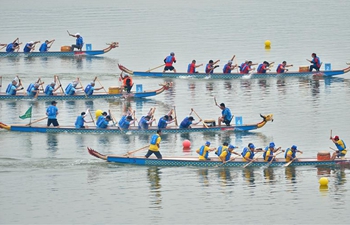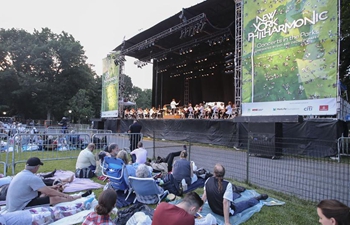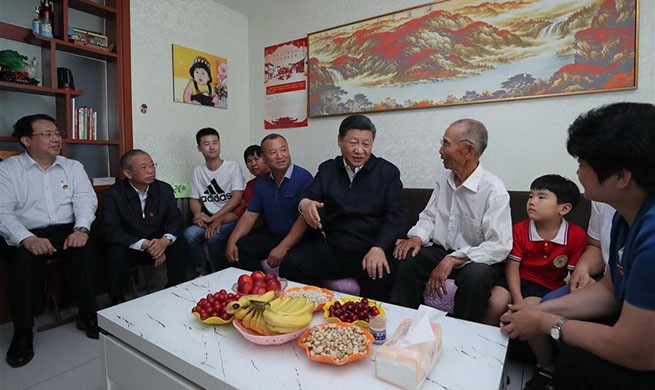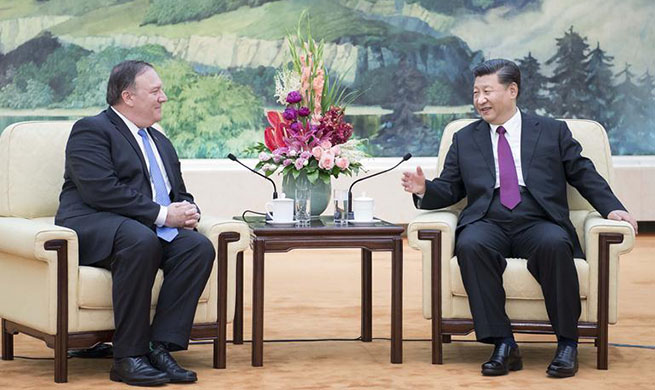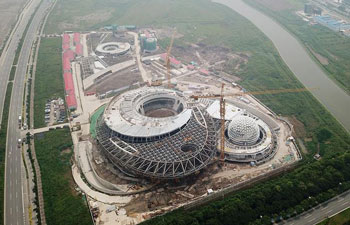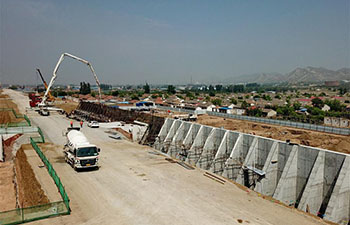BEIJING, June 15 (Xinhua) -- Although China failed to reach the 2018 FIFA World Cup finals in Russia, the failure of the national team doesn't seemed to have affected Chinese fans' passion for football's blue riband tournament.
According to FIFA statistics, Chinese football fans have purchased more than 40,000 tickets for the World Cup, ranking ninth among all countries and regions. This means there will altogether be about 100,000 Chinese fans in Russia, factoring in tickets allotted to Chinese companies as FIFA partners, World Cup sponsors and regional supporters.
This compares favorably with the 2002 World Cup, when the Chinese team qualified for the World Cup finals for the first and only time. That year, only around 50,000 Chinese fans turned up in Japan and South Korea to cheer on their heroes. At the two most recent World Cups in 2010 and 2014, fewer than 10,000 Chinese fans attended.
Tang Bin, a football superfan from China's southwestern city of Chengdu, plans on traveling to Russia and back to China every weekend during the World Cup.
"I cannot leave China for long enough to watch all the matches at the World Cup in Russia, but I also do not want to miss the games of my favorite teams - Spain and Germany. By my reckoning, the total cost will be around 50,000 RMB (8,000 US dollars), which I feel is worth the expense," Tang said.
The World Cup has also pushed up levels of consumption in China, with many fans stocking up on snacks and supplies to munch on while watching the games, many of which will go on long into the night in China. Chinese e-commerce platform Tmall is said to have 100,000 tons of beer in stock, as much as ten times more than during the 2014 World Cup.
Chinese fans watching games at home started storing food and drinks on May, when 1.7 million packages of sunflower seeds, a favored snack for Chinese, and 18 million bottles of beer were sold on Tmall, a big surge than on April.
In addition to football fans heading to Russia, the World Cup seems to have inspired many Chinese tourists to visit the country for non-footballing reasons. A recent survey conducted by Ctrip, China's leading flight and hotel booking platform, showed that bookings for flights to Moscow, St. Petersburg and other major cities in Russia have increased by 50 percent, with the number of tour groups to Russia rising by more than 35 percent. It's estimated about a total of 180,000 Chinese will visit Russia during the month-long tournament, accounting for more than ten percent of the expected 1.5 million foreign visitors from worldwide.
Shanghai and Beijing have provided the largest number of visitors to Russia during the World Cup, with Chengdu coming in third.
The World Cup in Russia is also a stage for Chinese companies to promote their brands, with names such as Wanda (property), Hisense (electronics), Vivo (smartphones) and Mengniu (dairy producer) all featuring prominently in World Cup-related advertising.
"The FIFA World Cup brings together the highest levels of competition and prestige in global football, making it the perfect sports event for us to be a part of. We believe that the competition will vastly improve global awareness and economic value for Hisense as a truly international brand," said Liu Hongxin, President of the Hisense Group.
Further Chinese influence at this World Cup comes in the form of the China-made mascots and souvenirs.
In 2013, Hangzhou Kayford Branding Co. became the first Chinese company to obtain the rights to produce official FIFA World Cup merchandise.
Li Zhijia, from Kayford's marketing department, said that the World Cup has become a top priority and that the company's participation in the tournament has opened many doors.
And the World Cup has even brought Chinese cuisine into sharp focus, with 100,000 crayfish being transported from China's central city of Wuhan to Moscow by rail a week ahead of Thursday's big kick-off.
"It almost feels like the only Chinese people not appearing at the World Cup are the Chinese national football team!" quipped television presenter Bai Yansong, perhaps summing up the prevailing attitude towards the Russia World Cup in China.






